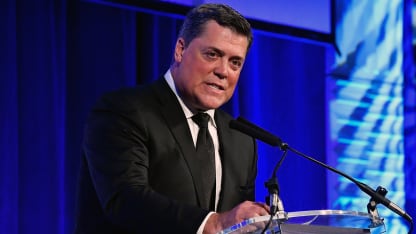Pat LaFontaine, a Hockey Hall of Famer and vice president of hockey development and community affairs for the NHL, will be speaking on Capitol Hill on Thursday to a group of staffers from The Hill and healthcare advocates about the impact of youth sports on child obesity. LaFontaine, the chief architect of hockey's Declaration of Principles, a vision statement positioning sports as a platform for participants to build character, foster positive values and develop important life skills, wrote an op-ed in The Hill on Oct. 15, pushing for the passing of the Personal Health Investment Today Act.
Here is the op-ed by LaFontaine:
LaFontaine says youth sports can break obesity cycle
Hockey Hall of Famer writes special op-ed to Senate for The Hill

© Larry French/Getty Images
By
Pat LaFontaine / NHL Vice President of Hockey Development and Community Affairs
I have come to recognize, after a career as a professional hockey player, that the true value of sports is the power it holds to teach life lessons, bestow positive values, build community and improve the trajectory of an individual's life.
And as a father and coach, I know that all parents want their children to grow up happy, healthy and successful. Participation in youth sports can set a child on a path toward all three. But as a society we need to encourage this positive behavior. We can do more to reduce barriers to play and improve the opportunity for all kids to get in the game. We are working to accomplish this, but the effort needs national support.
I commend Congress for exploring avenues to leverage youth sports participation as a vehicle to improve our current health care system. The House of Representatives took an initial step this past summer by allowing limited use of health savings accounts for the sole purpose of physical activity. This proposal won the support of 277 Republican and Democratic lawmakers. Legislation introduced by Sens. John Thune (R-S.D.) and Chris Murphy (D-Conn.) - titled the Personal Health Investment Today (PHIT) Act (S. 482) - would move us closer to removing economic barriers for rural and urban Americans alike and for all age brackets.
And there is no time to waste.
According to the Centers for Disease Control and Prevention, nearly 1-in-3 children and teens today are overweight or obese. Inactive children often become inactive adults. Today, only half of adults get the physical activity they need to help reduce and prevent chronic disease.
Inactivity has become a tax on America, approximately $117 billion in annual health care costs are associated with inadequate physical activity, according to a Designed to Move report. By 2030 the medical costs and loss in economic productivity associated with treating preventable, obesity-related diseases could total $580 billion annually.
Through a national commitment to youth sports, we can break the cycle.
Sports provide direct benefits to physical health and positively influences behaviors. Being active may lead to the prevention of heart disease, stroke and cancers, with reduction in smoking, teen pregnancy, drug use, addiction and suicide.
The psychological and mental health benefits associated with physical activity are also well documented. These include improvements in self-esteem, self-efficacy and body image, while preventing stress, depression and anxiety.
Sports help build character. Individuals learn life skills, social skills, time management, goal setting, leadership, honesty, integrity, respect, commitment, discipline and self-control. Strong networks and friendships can be formed and through sports, our young people make improvements in social inclusion, acceptance, gender equality and bridging differences between people.
Girls who participate in sports have higher self-image and confidence levels, improved teamwork and communication skills, increased graduation rates and leadership skills. United Nations research has shown that sports, when leveraged properly, can reduce crime, juvenile delinquency and gang participation.
A generation of children at play would result in reduced costs associated with health care and drug and crime prevention, while producing an increase in military-ready citizens, more inclusive communities and better equipped future leaders of America.
However, the level of physical activity in America continues to trend downward. Compared to 2012, two million more people were inactive in 2017, according to the Sports & Fitness Industry Association.
Fewer than half of kids 6-11 engage in the recommended amount of physical activity (60 minutes a day) and from age 9 to 15 American children's moderate-to-vigorous physical activity decreases by 75 percent. Youth inactivity is now reaching epidemic proportions in America.
Much of this is due to rising costs. The average family spends $671 per year on youth sports and more than 20 percent of parents spend more than $1,000 annually, per child, according to the National Council of Youth Sports. According to TIME, some families are spending more than 10 percent of their income on registration fees, travel, camps and equipment.
We need a catalyst to ease this burden and get kids moving and PHIT will be that spark.
PHIT will encourage consumers to invest in active, healthy lifestyles by helping with legitimate expenses incurred by families seeking to live and provide healthy, active lifestyles.
Without increasing caps, PHIT will allow Americans to use Pre-Tax Medical Accounts to pay for physical activity expenses including children's team registration fees, pay-to-play fees in schools, activity-based park programs, access fees, tournaments, camps and clinics. The purchase of items like basketball shoes, yoga pants or jerseys as apparel and footwear are specifically and rightfully excluded as eligible expenses.
Congress holds the power to promote positive change. The House passed its version of the PHIT bill in July. Now it's time for the Senate to pass the Thune-Murphy bill and improve health in America for generations to come.

















